Diplomatic Bluebook 2025
Chapter 3
Japan's Foreign Policy to Promote National and Global Interests
2 Cultural, Sports, and Tourism Diplomacy
(1) Overview
For a very large number of foreign nationals who have an interest in Japan, Japanese culture is a motive for their interests. MOFA and JF work to create positive images of Japan abroad, boosting the overall Japanese brand. In order to expand interest in, understanding of, and support for Japan amongst a wide range of people overseas and to increase the number of tourists visiting Japan, MOFA and JF carry out various projects ranging from communicating the appeal of Japanese culture to promoting sports and inbound tourism. For example, “Cultural Projects of Diplomatic Missions Overseas” introduce the broad spectrum of Japan's attractions, from traditional culture such as tea ceremony, flower arrangement, and martial arts, to food culture and pop culture such as anime, manga, and fashion.
In order to carry on the legacy of Tokyo 2020 Olympic and Paralympic Games held in 2021, MOFA engaged in initiatives as part of the “Sport for Tomorrow (SFT),” which is Japan's program for international exchanges and cooperation through sports, such as various sports exchanges and sports promotion support projects overseas, dispatching and inviting sports instructors through the JICA Japan Overseas Cooperation Volunteers (JOCV) program, and the provision of sporting equipment and improvement of sporting facilities through Cultural Grant Assistance. MOFA is also providing information about these initiatives in Japan and abroad on MOFA's “MofaJapan × SPORTS” official X (formerly Twitter) account.
MOFA also conducts a range of activities through Japan's diplomatic missions overseas to promote a deeper understanding of Japan amongst the diverse human resources who will lead the next generation. These include providing information on studying in Japan; building alumni networks comprising foreign nationals who have studied in Japan; cooperating with the JET Programme, which invites young foreign nationals to work for local governments in Japan; holding exchange and invitation programs for youth and adults from Asia, the U.S. and other regions; and providing support for Japanese studies at universities and research institutions.
Promoting Japanese language overseas fosters individuals who engage in exchange with Japan, deepens understanding of Japan, and creates foundations for friendship between Japan and other countries, while also contributing to the realization of a society of harmonious coexistence with foreign nationals in Japan. From these kinds of perspectives, within Japan the Act on Promotion of Japanese Language Education was promulgated and entered into force in June 2019, and the Basic Policy for the Comprehensive and Effective Implementation of Measures to Promote Japanese Language Education (Cabinet Decision) was formulated in June 2020. Based on these policies, through JF, MOFA is working to improve the overseas environment for Japanese language education, including by dispatching Japanese language specialists overseas, conducting training programs for overseas Japanese language teachers, and developing Japanese language education materials. MOFA has also been working to meet social need by providing Japanese language education to foreigners interested in coming to Japan for work.
In cooperation with the United Nations Educational, Scientific and Cultural Organization (UNESCO), Japan has been actively engaged in protecting tangible and intangible cultural heritage as well as natural heritage across the world. Moreover, Japan is actively taking part in the promotion of international frameworks for safeguarding heritage through conventions such as the World Heritage Convention and the Convention for the Safeguarding of the Intangible Cultural Heritage.
By putting creative efforts into promoting such cultural and sports diplomacy, such as through greater use of digital tools, and by sharing information on Japan's charms to the world, MOFA also contributes to bringing more foreign visitors to Japan in the future.
(2) Cultural Programs
For Japan's foreign policy to be smoothly implemented in the international community, it is important to promote a better understanding of Japan among the individuals who form the foundation of public opinion and policy making, and to make Japan's image even more positive. Based on this perception, MOFA engages in communicating information about the diverse attractions of Japan through diplomatic missions overseas and JF.
Diplomatic missions overseas carry out a range of cultural projects as part of efforts to promote a deeper understanding of Japan and to make Japan's image even more positive in the areas under their jurisdiction. For example, they actively introduce Japanese lifestyles and culture such as workshops on tea ceremony, flower arrangement and origami, Japanese film screenings, Japanese music performances, martial arts demonstrations, exhibitions on traditional crafts and Japanese photography, popular culture such as anime and manga, as well as Japan's food culture. At the same time, they also plan and implement Japanese speech contests and essay contests.
Additionally, MOFA takes advantage of years marking diplomatic milestones to revitalize cultural and people-to-people exchange projects and to further strengthen relations by intensively holding large-scale, comprehensive anniversary events with government-affiliated organizations and private companies. 2024 marks the 100th anniversary of the establishment of diplomatic relations between Japan and Türkiye, the 30th anniversary of the establishment of diplomatic relations between Japan and Palau, Japan-CARICOM Friendship Year 2024, the 30th anniversary of the establishment of diplomatic relations between Japan and North Macedonia, and the 60th anniversary of the establishment of diplomatic relations between Japan and Zambia, and a series of large-scale cultural events were held in commemoration.
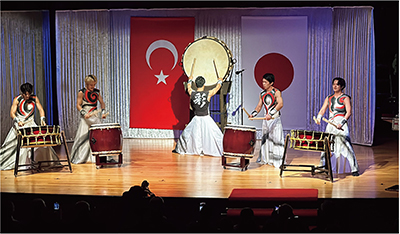 100th anniversary of the establishment of diplomatic relations between Japan and Türkiye (December 5 to 9, Istanbul, Türkiye)
100th anniversary of the establishment of diplomatic relations between Japan and Türkiye (December 5 to 9, Istanbul, Türkiye) Japan-CARICOM Friendship Year 2024 (May 3, Port of Spain, Trinidad and Tobago)
Japan-CARICOM Friendship Year 2024 (May 3, Port of Spain, Trinidad and Tobago)JF also leverages its overseas centers and, in collaboration with Japan's diplomatic missions overseas, develops and implements cultural and artistic exchange programs with partner countries.
In 2024, numerous commemorative events were held to mark the 100th anniversary of the establishment of diplomatic relations between Japan and Türkiye, including an installation exhibition by artist Chiharu Shiota at the Istanbul Museum of Modern Art, a performance by the Butoh dance company Sankai Juku at the Istanbul Theatre Festival, and the opening screening of an animated work on the Great East Japan Earthquake at the Ankara Japanese Film Festival. Meanwhile, the Japan Cultural Institute in Paris presented a range of projects in conjunction with the Paris Olympic and Paralympic Games, including the exhibition “KENZO TANGE – KENGO KUMA – Architects of the Tokyo Games,” which showcased the designers of Tokyo's Olympic venues, thereby serving as a hub for Japanese cultural outreach related to the Olympics and Paralympics. At the annual 2024 National Cherry Blossom Festival in Washington, D.C., the opening ceremony featured performances by folk singer MORIYAMA Naotaro, choreographer KANAMORI Jo, and musician Kaoru Watanabe. Alongside these overseas events, MOFA has also been actively working to expand its online cultural outreach. In August 2024 it launched “JFF Theater,” a new streaming platform for distributing Japanese video content, mainly movies, with multilingual subtitles, and over the following four months the platform presented a total of 15 titles.
 Japanese Film Festival (December 14, Yogyakarta, Indonesia; Photo: The Japan Foundation)
Japanese Film Festival (December 14, Yogyakarta, Indonesia; Photo: The Japan Foundation)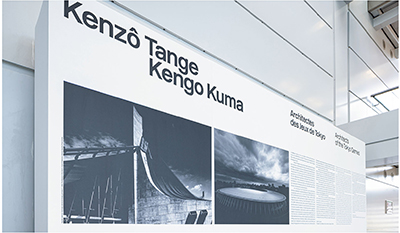 KENZO TANGE – KENGO KUMA Exhibition (May 2 to June 29, Paris, France; Photo: The Japan Foundation)
KENZO TANGE – KENGO KUMA Exhibition (May 2 to June 29, Paris, France; Photo: The Japan Foundation) Butoh dance company Sankai Juku performance in Istanbul (October 24 to 25, Istanbul, Türkiye; ©Yoichiro Yoshikawa)
Butoh dance company Sankai Juku performance in Istanbul (October 24 to 25, Istanbul, Türkiye; ©Yoichiro Yoshikawa)Additionally, after being announced at the Commemorative Summit for the 50th Year of ASEAN-Japan Friendship and Cooperation in December 2023, the “Partnership to Co-create a Future with the Next Generation: WA Project 2.0” was also launched. This is a people-to-people exchange program that will be intensively implemented by JF over the 10-year period from 2024 to 2033 between Japan and ASEAN countries, with the two-pillar projects of “Two-way Intellectual and Cultural Exchange” and “NIHONGO Partners.” In 2024, the first year of the program, while building the foundations of the program through system design and pilot project trials, the Japanese Film Festival (JFF) was also held in Southeast Asian countries, screening a wide variety of films, mainly new and recent releases, with the aim of spreading interest in Japanese culture and society and fostering momentum for Japanese language learning.
The Japan International MANGA Award was launched by MOFA in 2007 to honor overseas manga artists who have created outstanding manga works, with the aim of spreading manga culture overseas and promoting international cultural exchanges through manga. The 18th Japan International MANGA Award, held in 2024, received a record-high 716 entries from 95 countries and regions; the Gold Award was presented to a work from Brazil, and Silver Awards were presented to works from Thailand, Taiwan and Chile. In addition, this year there were entries for the first time from seven countries: Yemen, Dominica, Namibia, Barbados, Laos, Luxembourg and Equatorial Guinea.
 Japan International MANGA Award Ceremony (March 5, Tokyo)
Japan International MANGA Award Ceremony (March 5, Tokyo)(3) People-to-People Exchange and Exchanges in the Area of Education and Sports
To build personal relationships and promote a better understanding of Japan, MOFA carries out a number of programs that invite foreign nationals who have a significant influence on shaping public opinion and the policymaking process and who are expected to play a leading role in various fields. In the area of education and sports, MOFA conducts various activities to promote a wide range of people-to-people exchanges. These programs not only promote mutual understanding and friendships but also enhance Japan's presence in the international community, which considerably benefits Japan's national diplomatic interests.
A Student Exchange Programs
MOFA actively introduces the attractiveness and opportunities of studying in Japan to foreign nationals through Japanese diplomatic missions overseas, and implements application and screening procedures to grant the Japanese Government (Ministry of Education, Culture, Sports, Science and Technology) Scholarship to promising students abroad. It also makes efforts to network with former international students who have returned to their home countries through Japan Alumni Associations and to expand interest in, understanding of, and support for Japan. In March, the fourth Japan Alumni Conference was held in a hybrid format following the event held in the previous year. At the Conference, participants gave reports on each alumni association's domestic activities and exchanged opinions about conferences held in each region, and strengthened networks among alumni from different countries.
The Quad Fellowship was announced at the Second Japan-Australia-India-U.S. (Quad) Summit Meeting in September 2021 as an educational and people-to-people exchange cooperation program, and awards scholarships for studying in the U.S. to outstanding individuals in STEM fields (science, technology, engineering, and mathematics) from the four countries. Under this framework, in August the 50 fellows of the second cohort (10 from each of Japan, India, Australia, and the U.S., and 10 from the ASEAN region) began their studies in the U.S., bringing the total number of participants to 150.
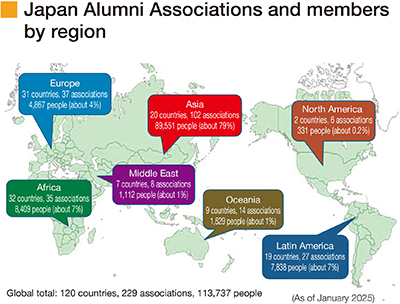
B JET Programme (The Japan Exchange and Teaching Programme)
The JET Programme was launched in 1987 to improve foreign language education in Japan and promote international exchange with Japanese citizens in local areas. This program is administered by local authorities and other organizations in cooperation with the Ministry of Internal Affairs and Communications (MIC), MOFA, the Ministry of Education, Culture, Sports, Science and Technology (MEXT), and the Council of Local Authorities for International Relations (CLAIR). Through the program, young foreign nationals are invited to Japan and appointed to posts in local governments and schools. MOFA is responsible for the application and screening process, pre-departure orientation, and support for the activities of the JET Alumni Association (JETAA), which operates in 19 countries and has about 25,000 members. In FY 2024, 5,861 participants from 51 countries, including 2,006 new participants, were dispatched to all parts of Japan, and more than about 79,000 people have participated in the JET Programme to date as of July 1, 2024. JETAA conducts activities to introduce Japan in many countries. Many of those who went through the JET Programme are important human and diplomatic assets for Japan, as they go on to engage in activities that contribute to expanding interest in, understanding of, and support for Japan while also playing an active role in a variety of fields in their own countries.
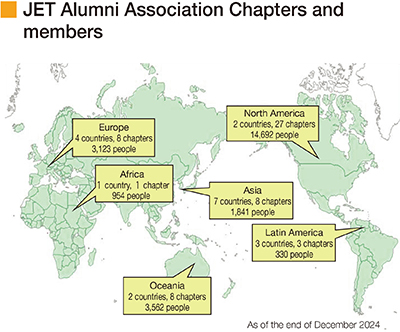
 2024 JETAA USA National Conference participants (September 27 to 29, St. Paul, U.S.)
2024 JETAA USA National Conference participants (September 27 to 29, St. Paul, U.S.)C Sports Exchange
Sports enable communication beyond language and can be an effective tool for promoting friendly relations and a better understanding of Japan. Under the “Projects for Sports Diplomacy Enhancement” scheme, MOFA is engaged in sports exchange and cooperation initiatives including providing support for the transport of equipment to sports organizations in various countries, thereby contributing to the development of bilateral relations. These projects contribute to enhancing mutual understanding internationally by promoting diplomacy through sports and by expanding interest in, understanding of, and support for Japan. At the same time, they also improve the standing of Japan in the world of international sports.
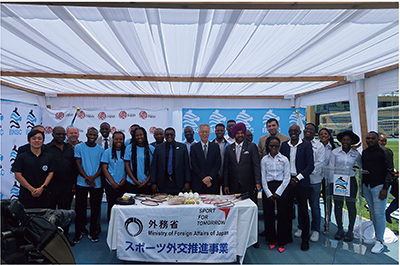 Projects for Sports Diplomacy Enhancement: Handover ceremony of badminton equipment to Botswana (November 20, Botswana)
Projects for Sports Diplomacy Enhancement: Handover ceremony of badminton equipment to Botswana (November 20, Botswana)■The Olympic and Paralympic Baton Passed from Tokyo to Paris
In the summer of 2024, the Paris 2024 Olympic and Paralympic Games (Paris Games) were held in France. Previously, the Olympic and Paralympic Games Tokyo (Tokyo Games) were held in 2021 during the COVID-19 pandemic, and the athletes' bold and courageous performances amid so many restrictions and constraints inspired hopes and dreams. Three years have passed since then, and in Paris, which received the baton from Tokyo, the Olympic and Paralympic Games were held with spectators being welcomed back, and the athletes' great performances, cheered on by live crowds, were broadcast to the world.
■Projects for Sports Diplomacy Enhancement: Support for Transport of Sports Equipment
At the Paris Games, 207 countries and regions took part in the Olympics and 167 took part in the Paralympics. One of the initiatives behind the scenes that supports the development of sports in various countries is the “Projects for Sports Diplomacy Enhancement” scheme, promoted by the Ministry of Foreign Affairs (MOFA). This project was launched in 2015 to build momentum for the Tokyo Games, and involves inviting and dispatching athletes and coaches, and supporting the transport of sports equipment. Some athletes who visited Japan through this project have continued to play an active role and participated in the Paris Games.
Currently, MOFA is continuing its “Support for Transport of Sports Equipment” initiative, in which it provides financial support for the international transport costs of sports equipment donated by supervisory sports organizations in Japan to overseas supervisory sports organizations. Under this framework, a variety of sports equipment has been delivered to a total of 66 countries over the past 10 years.
Many countries and regions face shortages of sports equipment, and donations of equipment from Japan are greatly appreciated by a wide range of people, including local sports-related officials, youth, and government representatives alike. Such support contributes not only to the development of sports locally, but also to good bilateral relationships with Japan and to promoting international exchanges at the grassroots level through sports.
In 2024 as well, Japan continued to donate sports equipment to various countries and regions. In June, on the occasion of State Minister for Foreign Affairs TSUJI Kiyoto's visit to Tajikistan, football wear donated by the Japan Football Association was handed over to the Tajikistan Football Federation. Expressions of gratitude have also been received from sports organizations of other countries that benefited from these donations, and the following is a selection of their comments:
Colombia Badminton Federation (Badminton equipment donated by the Badminton Association of Japan)
 Handover ceremony of badminton equipment to Colombia (February 27, Colombia)
Handover ceremony of badminton equipment to Colombia (February 27, Colombia)We are extremely grateful for this support from the people of Japan to improve the sports environment for children, women, and athletes, and to develop culture. It is a great honor for our Federation to have this opportunity and to have forged such a strong bond with the Badminton Association of Japan. We will make the most of this support, which is truly needed by many young people and citizens.
Shooting Association of Maldives (Rifle shooting coats and uniforms donated by the Japan Rifle Shooting Sport Federation)
 Handover ceremony of rifle shooting coats and uniforms to the Maldives (May 16, Maldives)
Handover ceremony of rifle shooting coats and uniforms to the Maldives (May 16, Maldives)Shooting sports in the Maldives are still developing. This donation lays a foundation for their development and symbolizes the friendship and cooperative relationship between the Maldives and Japan. On behalf of the Shooting Association of Maldives, I would like to express my deep gratitude for the donation of the shooting coats and uniforms. Japan's continuous assistance and support have played a vital role in the development of the Maldives. I am confident that this donation will be a step toward further strengthening the friendship and strong ties between the two countries.
D Japan's Friendship Ties Programs
With a view to expanding the basis for Japan's diplomacy, which develops bilateral and inter-regional relationships between Japan and countries and regions in the Asia-Pacific, North America, Europe, Latin America and the Caribbean, MOFA implements the Japan's Friendship Ties Programs to promote multifaceted understanding of Japan to youths from various countries and regions, through invitations, dispatches, and online exchanges, striving to seek and cultivate future generations with great affinity toward or knowledge of Japan, and working to strengthen the spread of information about Japan from overseas. In 2024, about 2,500 youths participated in these programs, attending lectures by Japanese experts in politics, economics, society, culture, history, and diplomatic policies, and also went on observation tours in each field and had exchanges of opinions and experienced Japanese culture. These programs kindled interest in Japan amongst young people from various countries and regions; broadened the base of support for Japan; and contributed to promoting understanding of Japan and making Japan's image even more positive in the international community via participants sharing what they learned through the program and their experiences in Japan through reports to their organizations and on social media. In addition, 95 follow-up programs, such as alumni reunions and online Japan revisits, have been held for alumni of these programs, thereby continuing to foster strong networks and to promote an even deeper understanding of Japan's relations with other countries and regions in their respective areas of interest.
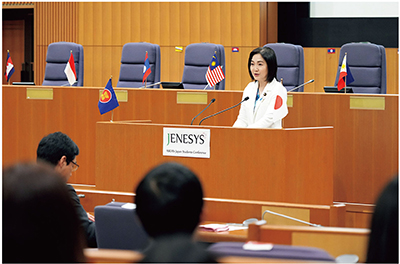 Participants in the JENESYS2024 ASEAN-Japan Students Conference paid a courtesy call on Parliamentary Vice-Minister for Foreign Affairs IKUINA Akiko (January 15, 2025, Tokyo)
Participants in the JENESYS2024 ASEAN-Japan Students Conference paid a courtesy call on Parliamentary Vice-Minister for Foreign Affairs IKUINA Akiko (January 15, 2025, Tokyo) Participants in the KAKEHASHI Project Japanese American youth invitation program visit the Japanese Overseas Migration Museum (December 17, Kanagawa Prefecture; Photo: Japan International Cooperation Center)
Participants in the KAKEHASHI Project Japanese American youth invitation program visit the Japanese Overseas Migration Museum (December 17, Kanagawa Prefecture; Photo: Japan International Cooperation Center) JENESYS2024 ASEAN-Japan Sports x SDGs Exchange for Youths (October 31, Fukushima Prefecture; Photo: Japan International Cooperation Center)
JENESYS2024 ASEAN-Japan Sports x SDGs Exchange for Youths (October 31, Fukushima Prefecture; Photo: Japan International Cooperation Center)(4) Exchange in the Intellectual Field
A Japanese Studies
Through JF, MOFA comprehensively supports a range of overseas research activities related to the politics, economy, society, and culture of Japan. In 2024, JF's Japanese Studies Fellowship Program provided 86 researchers with the opportunity to visit Japan for research. As part of the “Partnership to Co-create a Future with the Next Generation: WA Project 2.0” project and with the aim of establishing an ecosystem to continuously produce and nurture Japanese studies specialists, particularly those from ASEAN countries, in collaboration with the Institute for Advanced Studies on Asia at the University of Tokyo and the International Research Center for Japanese Studies, JF co-hosted a series of networking events held in Tokyo (November) and Kyoto (December) that were organized to provide opportunities, particularly for researchers, to form and strengthen their networks.
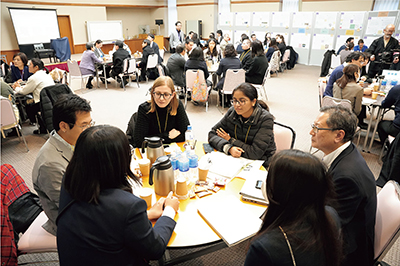 Networking event held at the International Research Center for Japanese Studies (December 20, Kyoto Prefecture; Photo: The Japan Foundation)
Networking event held at the International Research Center for Japanese Studies (December 20, Kyoto Prefecture; Photo: The Japan Foundation)JF also dispensed grants for expanding Japanese studies faculty members, for organizing seminars and symposiums, dispatch of visiting professors, and for expanding the collection of books on Japan to a total of 45 institutions of Japanese studies in 25 countries and regions in 2024. In addition, it provided support to academic societies with the goal of promoting network building among Japanese studies researchers and research institutions from various countries and regions.
B International Dialogue
Through JF, MOFA implements Global Partnerships Programs for international dialogues that aim to create and share new knowledge and wisdom, to resolve common issues, and to deepen mutual understanding among future generations. Specifically, it hosted seminars and symposiums based on the themes of common international issues, and conducted exchanges by dispatching or inviting prominent cultural figures and other guests. It planned, implemented, and supported exchange projects that contribute to promoting dialogue at various levels, human resource development, and the establishment of interpersonal networks. These include the implementation of the Japan Outreach Initiative (JOI) program, which dispatches Japanese coordinators to the U.S. with a view to deepening interest in and understanding of Japan at the grassroots level in the U.S.
In 2024, following on from the previous year, the Japan Foundation Indo-Pacific Partnership Program (JFIPP) was implemented, in which experts and practitioners from the region tackle common issues in order to develop human resources who can contribute to the realization of a “Free and Open Indo-Pacific (FOIP),” with a total of 78 people participating. In addition, Ukrainian poet Ostap Slyvynsky was invited to Japan in January, and roundtable discussions and dialogue events were held with Japanese cultural figures and others in various regions. Overseas, cultural anthropologist and manga artist TSURU Daisaku and manga artist SUMIYOSHI Ryo were dispatched to Peru, Brazil, and Mexico, where they held dialogue events with researchers and creators from various regions on the theme of worldviews and character designs in Japanese manga and anime creations, attracting a total of more than 1,200 participants. Additionally, as part of the “Partnership to Co-create a Future with the Next Generation: WA Project 2.0,” JF invited a total of 55 teachers from secondary education institutions in ASEAN countries to Japan, and implemented programs such as school visits, opinion exchanges with Japanese teachers, experiences in Japanese culture, and on-site tours of Japan's efforts to address global issues. It is hoped that these programs will deepen the participants' understanding of and affinity for Japan, and that they will be able to apply the results of their experiences to their own educational settings after returning home.
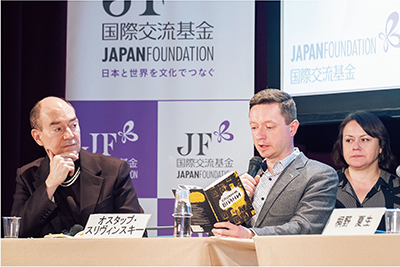 Roundtable discussion with Ukrainian poet Ostap Slyvynsky (January 19, Tokyo; Photo: The Japan Foundation)
Roundtable discussion with Ukrainian poet Ostap Slyvynsky (January 19, Tokyo; Photo: The Japan Foundation)C Japan-United States Conference on Cultural and Educational Interchange (CULCON)
CULCON is a panel where experts from the public and private sectors in Japan and the U.S. engage in discussions on culture, educational exchanges, and intellectual dialogues. In February, March, August and December, its two Working Groups, “Information Access and Sharing in the Digital Age (IAS)” and “Subnational Diplomacy / Local & Regional Exchange (SND),” each convened meetings, with members from both countries deepening their discussions in preparation for their final report by the end of fiscal year 2025.
D Cooperation with the United Nations University (UNU)
The UNU is the only UN organization headquartered in Japan, and, as a think tank for all UN agencies, the UNU contributes to the international community not only in research on global issues including the Sustainable Development Goals (SDGs) but also in human resource development by offering degree programs, and in 2025 UNU celebrated its 50th anniversary. Japan provides a variety of cooperation and support to UNU. In July, MOFA co-hosted with UNU the event “Dialogue with the Youths: Toward the Summit of the Future” at UNU's headquarters, where Foreign Minister Kamikawa and UNU Rector Tshilidzi Marwala jointly engaged Japanese and international youth in discussions on their visions of prosperity to pursue and on the meaningful participation of youth in decision-making for global initiatives. In August, Rector Marwala delivered the keynote address at Session 1 (Society: “Realizing a Sustainable Future”) of the TICAD Ministerial Meeting and served as moderator for the thematic panel discussion “Innovation in Africa.”
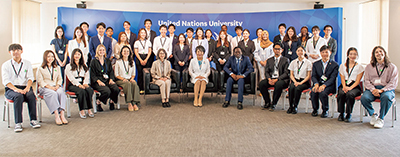 “Dialogue with the Youths: Toward the Summit of the Future” event (July 22, Tokyo)
“Dialogue with the Youths: Toward the Summit of the Future” event (July 22, Tokyo)In addition, UNU Senior Vice-Rector and UN Assistant Secretary-General SHIRAHASE Sawako, is helping to promote discussion on SDGs through the BIG IDEAS dialogue series and other initiatives.
(5) Promotion of the Japanese Language
As the globalization of Japan's economy prompts more Japanese companies to do business overseas and Japanese pop culture finds global popularity, interest in the Japanese language is growing around the world, especially overseas among young people. Further promotion of the Japanese language overseas promotes understanding of Japan overseas and fosters a more favorable international environment for Japanese people and companies, as well as improving the Japanese language proficiency of foreign nationals who wish to work in Japan, thereby contributing to the realization of a society of harmonious coexistence with foreign nationals in Japan. A survey conducted by JF in FY2021 found that approximately 3.79 million people in 141 countries and regions overseas learn Japanese. The number of applicants for the Japanese Language Proficiency Test (JLPT) offered by JF (including those taking the test in Japan) temporarily decreased after 2020 due to the spread of COVID-19, but has since recovered and has been rapidly increasing, with the number of applicants in 2024 reaching a record high of about 1.72 million.
Through JF, MOFA is working to improve the environment for and to address the diverse needs related to Japanese language education overseas. For example, JF dispatches Japanese language specialists abroad; carries out training programs for Japanese language teachers, foreign-service officers and public officials; trains cultural and academic personnel; supports Japanese language education for children; conducts Japanese language pre-training for nurse and care worker candidates under the Economic Partnership Agreement (EPA) with Indonesia and the Philippines; encourages educational institutions in each country and region to introduce Japanese language education and supports Japanese language educational activities; develops teaching materials; runs e-learning programs; and promotes the “JF Standard for Japanese-Language Education,” which corresponds with international standards for foreign language education. As a major pillar of the “Partnership to Co-create a Future with the Next Generation: WA Project 2.0” initiative, JF dispatches NIHONGO Partners to support Japanese-language instruction at secondary schools and similar institutions across ASEAN countries and beyond. In 2024, a total of 285 NIHONGO Partners were dispatched to ten countries. Additionally, 49 teachers and 77 students from host institutions were invited to Japan for training opportunities. To address labor force shortages brought about by the declining birthrate and aging population in Japan, Japan has begun to accept foreign nationals under the April 2019 residence status as “Specified Skilled Workers.” Accordingly, through JF, MOFA has been taking new measures since then in accordance with the “Comprehensive Measures for Acceptance and Coexistence of Foreign Nationals” (decided upon at the December 25, 2018, Ministerial Conference on Acceptance and Coexistence of Foreign Nationals), that include conducting the Japan Foundation Test for Basic Japanese (JFT-Basic), which assesses the Japanese language ability of foreign nationals who come to Japan (by the end of 2024, a total of about 310,000 people have taken the test in 11 countries overseas and within Japan), as well as developing and disseminating learning materials and curriculum with the goal of fostering people's Japanese language ability effectively, and nurturing local Japanese language teachers who teach Japanese to those who wish to work in Japan.
The Japan Foundation (JF) has launched a 10-year initiative from 2024 to 2033 that intensively implements various exchange programs across Asian countries and regions, particularly among the Association of Southeast Asian Nations (ASEAN), in the fields of Japanese language education, culture and art, Japanese studies, international dialogue, and others. Named the “Partnership to Co-create a Future with the Next Generation: WA Project 2.0,” this project succeeds the “WA Project: Toward Interactive Asia through Fusion and Harmony,” which ran from 2014 to 2023. Through sustained people-to-people exchanges and human resources development among the next generation in Asian countries and Japan, this initiative aims to forge relationships for co-creating the future.
 Sushi-making experience planned by NIHONGO Partners (June, Penang, Malaysia; Photo: The Japan Foundation)
Sushi-making experience planned by NIHONGO Partners (June, Penang, Malaysia; Photo: The Japan Foundation)One of the pillars of this project is the continuation of the “NIHONGO Partners” program, in which Japanese nationals are dispatched to secondary schools and other institutions across Asian countries and regions to serve as partners for local Japanese language teachers and students, supporting Japanese language classes and introducing Japanese culture. There has been a great deal of positive feedback from host communities: “Having the opportunity to directly speak and interact with a native Japanese speaker sparked my curiosity about them and strengthened my desire to study Japanese more.” JF has also heard feedback from the NIHONGO Partners themselves who are active in various regions: “I feel as though I have found a second home,” and “I want to become a goodwill ambassador between our two countries.” These responses attest to the success in cultivating individuals who can act as bridge-builders on both sides of the relationship. Under WA Project 2.0 and in order to deepen interest in the Japanese language and in Japan, JF will further enhance the initiatives, including full-scale cultural events at schools that NIHONGO Partners are dispatched to and invitations for local teachers and students to visit Japan.
 Group photo of APP Camp participants (July, Penang, Malaysia; Photo: Producers Connect Japan (PCJ))
Group photo of APP Camp participants (July, Penang, Malaysia; Photo: Producers Connect Japan (PCJ))Exchanges in cultural and artistic fields have also begun. In July, Japanese performing arts professionals were dispatched to the Asian Producers' Platform Camp (APP Camp)1 held in Malaysia. As one participant noted, “The trust built through living together and discussing with producers from across the countries and regions is something that could not have been achieved elsewhere,” which underscores how the active interactions and exchanges of views among attendees from various Asian countries seemed to be an excellent stimulus, the event provided a place to build networks that can lead to future collaborations. In October, coinciding with Tokyo International Film Festival, JF invited eight film programmers who are actively working in Southeast Asian countries, thereby providing them with an opportunity to deepen their knowledge of Japanese films and to build personal connections. After returning home, they plan to organize screenings of Japanese films by themselves in their respective countries, and the future responses to those films from each region are eagerly anticipated.
 Participants in the “ASEAN-Japan Exchange Program for Secondary School Educators” visiting the Awa Odori Kaikan (November, Tokushima City, Tokushima Prefecture; Photo: The Japan Foundation)
Participants in the “ASEAN-Japan Exchange Program for Secondary School Educators” visiting the Awa Odori Kaikan (November, Tokushima City, Tokushima Prefecture; Photo: The Japan Foundation)The ASEAN-Japan Exchange Program for Secondary School Educators is one of the newly launched programs, in which teachers from junior and senior high schools in ASEAN states are invited to Japan to deepen their understanding of topics including Japanese education through activities including visits to regional schools. In November 2024, the first year of the program, JF invited 26 school principals and educational administrators, as well as 29 social studies teachers. Encouraged by comments from participating teachers such as “I hope that more participants will have the same experience as I had,” JF will continue to refine the program to meet such expectations.
From 2025 onward, JF has planned an even broader array of exchange programs. As the circle of exchanges from the WA Project 2.0 continues to expand between Japan and Asian countries and regions, including ASEAN, toward 10 years later in 2033, it will be exciting to see the new futures that emerge.
- 1 The Asian Producers' Platform is a platform started in 2014 with the aim of deepening networking among performing arts producers and creators in the Asia-Pacific region. At the APP Camp, held once a year by APP, participants from each country can deepen their networks, foster relationships of trust, and improve their own abilities by staying together about a week.
(6) Cultural Grant Assistance
As part of the Official Development Assistance (ODA), the Government of Japan provides Cultural Grant Assistance to support the purchase of materials and equipment and the development of facilities to be used for the promotion of culture, sports, and higher education, as well as the conservation of cultural heritage in developing countries, thereby enhancing mutual understanding and friendly relations between Japan and these countries. In 2024, the Government of Japan has funded three General Cultural Grant Assistance projects (totaling 372.7 million Japanese yen) and 17 Grant Assistance for Cultural Grassroots Projects (totaling 153.34 million Japanese yen). Specifically, the General Cultural Grant Assistance projects provided equipment to Egypt, Mongolia, and Senegal to support educational activities as well as to promote and develop judo. The Grant Assistance for Cultural Grassroots Projects focused primarily on cooperation in the field of promoting sports, particularly Japanese martial arts (budo), and Japanese language education.
(7) Cooperation through United Nations Educational, Scientific and Cultural Organization (UNESCO)
UNESCO is the first international organization that Japan became a Member State of after the war, in 1951. Japan is actively involved in a variety of UNESCO projects in the fields of education, science, and culture. Since 1952, Japan has continued to serve as a Member State of the Executive Board of UNESCO.
Japan also cooperates with UNESCO to provide support to developing countries in areas such as education, science, and culture. In the field of culture, Japan is providing cooperation with the preservation and promotion of the world's tangible and intangible cultural heritage as well as the provision of support in the field of human resource development as its major pillars. It also participates proactively in international frameworks for the protection of cultural heritage. Representative efforts in this area include the provision of support for the restoration and preservation of Angkor monuments in Cambodia since 1994, and the restoration and preservation of the Bamiyan ruins in Afghanistan since 2003. In these projects, Japanese experts played a central role, and human resource development was undertaken to enable local people to protect such sites by themselves in the future. At the same time, Japan is also providing support for the development of conservation and management plans for heritage sites, as well as for their preservation and restoration. Furthermore, Japan continues to provide support through UNESCO to Ukraine's cultural and education sectors, which are facing significant difficulties. In June, Parliamentary Vice-Minister for Foreign Affairs KOMURA Masahiro attended the “Towards the recovery of the culture sector of Ukraine” international conference, which was hosted by the Government of Lithuania with the cooperation of UNESCO and the Government of Ukraine, and emphasized the need for solidarity among the international community for the reconstruction of Ukraine. In recent years, Japan has also been providing support for human resource development to African countries and small island developing states to help them strike a balance between protecting cultural heritage and sustainable development. As for the safeguarding of intangible cultural heritage, support is provided to projects to pass on traditional performing arts such as music, dance, and traditional arts and crafts to the next generation in developing countries, as well as to projects involving the development of domestic institutions and capacity building for relevant parties to enhance countries' ability to safeguard intangible cultural heritage by themselves.
UNESCO Director-General Audrey Azoulay has been promoting “Strategic Transformation” toward strengthening UNESCO, which includes reforms for the de-politicization of UNESCO and organizational reforms, and Japan has been consistently supporting the Director-General in her work. In February, Foreign Minister Kamikawa, who attended the G20 Foreign Ministers' Meeting (Brazil), met with Director-General Azoulay and concurred to continue cooperating on various issues at UNESCO, including safeguarding culture in the areas of conflict. Japan will continue to contribute proactively to the activities of UNESCO that are being promoted under the leadership of Director-General Azoulay.
A World Heritage Convention
The World Heritage Convention aims to protect cultural heritage and natural heritage internationally as heritage belonging to all mankind. Japan concluded the Convention in 1992 (as of December 2024, the number of States Parties to the Convention is 196). The sites listed on the “World Heritage List” are known as “World Heritage Sites.” They are classified into “Cultural Heritage Sites” (monuments and remains), “Natural Heritage Sites” (natural areas) and “Mixed Heritage Sites” (sites with both cultural and natural elements). As of December 2024, a total of 1,223 World Heritage Sites are included on the World Heritage List, including 26 heritage sites (21 cultural heritage sites and five natural heritage sites) in Japan. The 46th session of the World Heritage Committee was held in July 2024 in New Delhi, the capital of India.
At the July 2024 meeting, the “Sado Island Gold Mines” (Niigata Prefecture) were inscribed as a World Heritage Site by consensus of all Members States of the World Heritage Committee.
B Convention for the Safeguarding of the Intangible Cultural Heritage
The Convention for the Safeguarding of the Intangible Cultural Heritage aims to develop an international system for safeguarding intangible cultural heritage such as traditional performing arts and traditional craftsmanship techniques (as of December 2024, the number of States Parties to the Convention is 183). Japan, with abundant experience in safeguarding domestic intangible cultural properties, served as the chair of the intergovernmental working group reviewing the operational mechanism of this Convention, and leads discussions by incorporating requests from developing countries. In December 2024, it was decided that “Traditional knowledge and skills of sake-making with koji mold in Japan,” proposed by Japan, would be included in the Representative List of the Intangible Cultural Heritage of Humanity created under the Convention, bringing the total number of items inscribed under the register from Japan to 23. Currently, proposals have been submitted to the UNESCO Secretariat as a new nomination, “Shodo: Calligraphy in Japan” and for inscriptions on an extended basis, “Washi, craftsmanship of traditional Japanese hand-made paper,” “Yama, Hoko, Yatai, float festivals in Japan,” and “Traditional skills, techniques and knowledge for the conservation and transmission of wooden architecture in Japan.”
C UNESCO Memory of the World Programme
The UNESCO Memory of the World Programme was established in 1992 to promote the safeguarding of and access to, and raise awareness of valuable archival heritage. Of these, according to the UNESCO website, as of December 2024, 496 items have been inscribed under the international register.
The fact that the governments of Member States could not be involved in the assessment process of the nominations under the previous mechanism, even in the cases where there are clear discrepancies of views between the concerned Member States, is not consistent with the founding principle of UNESCO: promoting friendly ties and mutual understanding among Member States. After 2017, submission of new nominations was suspended, and Japan led the comprehensive review process of the programme. As a result, a new mechanism was approved by the UNESCO Executive Board in April 2021, under which nominations are submitted through the governments of Member States. Additionally, a contestation system was newly established, which keeps nominations over which Member States have conflicting views on hold until dialogues between the concerned countries have been concluded. With the completion of the review process, the call for new nominations resumed in July of the same year, and in May 2023, new inscriptions of 64 items were decided, including the “The Monk Enchin Archives: A History of Japan-China Cultural Exchange” (nominators: Onjo-ji Temple and Tokyo National Museum), nominated by Japan.


